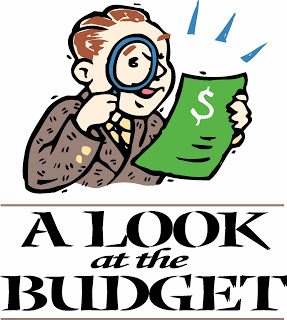PersonalFN's

Presents
How To Become
Your Own Financial Planner?
An exclusive Program To Develop The Skills To Manage Your Personal Finance
We believe by signing up for the initiative, you too endeavour to develop the skills needed to understand the nuances of personal finance and be money-wise.
So let's begin this journey with
Module I: How To Make Your Budget & Design Your Cash Flows
Session 1: 5 Vital Tips For Prudent Budgeting
Why You Should Create a Budget
-The Art of Budgeting
Despite earning reasonably high income, a number of people are left without any investible surplus. The reason is they aren't in control of their personal finances; they've failed to control expenses...and as result their finances are in total disarray.
Without prudent budgeting it's impossible to keep track of your hard-earned money, which if wisely saved, can help in achieving your financial goals. Remember, budgeting is at the centre of achieving long term financial goals.
If your monthly expenses take a lion's share out of your monthly, how can you achieve your aspirations? And if you seek loans to do so, one day it can land you in a debt-trap. Hence, budgeting is paramount!
Budgeting refers to identifying, classifying, and allocating the expenses, including EMIs vis-a-vis the income in a way that leaves you with surplus. The surplus can be invested wisely.
So, by making a budget, you can work towards tightening your expenses -- say, lifestyle (i.e. entertainment and shopping), household (which includes grocery, electricity), maintenance (for house repairs, car servicing), personal (mobile phone bills), etc.
And while you make a budget, honestly assess your own outlook towards money. Perhaps it will help you become 'money-wise' ...by bringing down living costs or expenses that are otherwise frivolous. So, this may help you do a cost-benefit analysis.
Hence, a budget is an eye opener! It makes you realise where a bulk of your income is being spent.
It instils the habit of living within one's means; which seems to be an eluding, by virtue of the advent of plastic money amidst the materialistic world we live in.
Let us understand the concept of Budgeting better with the help of a short story...
Rajesh works for a logistic company. His monthly salary (after tax) is Rs 30,800.
His wife Sheela works at an insurance company as a customer service representative. Her monthly salary (after tax) is Rs 10,000.
They have two children-Vivek and Swapnil. Vivek is 8 years old while Swapnil is 3. They own a car which Rajesh drives to office in. Sheela uses public transport to travel.
They have rental payments of Rs 10,000 per month and a personal loan of Rs 1,50,000.
They decided to work on a budget so that they could allot more income towards their investments.
Cash Flow statement for the month of … |
Cash Inflows (A) |
|
Rajesh's monthly salary (after tax) |
30,800 |
Sheela's monthly salary (after tax) |
10,000 |
Total monthly cash inflows (A) |
40,800 |
Cash Outflows (B) |
|
Rent |
10,000 |
Internet Bill |
1,200 |
Petrol and Car Expenses |
5,750 |
Mobile and landline Bill |
3,750 |
Cable TV |
500 |
Electricity and Gas Bill |
1,250 |
Gym membership |
5,000 |
EMI |
7,000 |
Railway Pass |
215 |
Day Care (Crèche) |
750 |
Dining out |
1,050 |
Vivek's school fees and music classes |
2,300 |
Laundry |
430 |
Milkman |
250 |
Total monthly cash outflows (B) |
39,445 |
(For illustration purpose only)
Observations:
(From the table it is clear that) Rajesh and Sheela save Rs 1,355 per month (i.e. a meagre 3.32%). Rajesh and Sheela should analyse how they can cut down on their expenses to save more. One such possibility is for Rajesh to use public transport instead of driving his car to office. This will increase his savings by Rs 5,535 (i.e. 5,750 - 215). (Since both of them use mobile phones) they can consider surrendering their landline. (This will help them save further). Rajesh should reconsider the gym he goes to. His gym membership costs Rs 5,000 per month (i.e. 12.25%) or he can consider other options like jogging, yoga, etc. to stay fit. They should be judicious when using electricity and gas. Turning off the fan and tube-light when not in use, will help in reducing the bill and increase the savings.
The above measures may seem difficult in the beginning. But, they would in turn increase the savings to Rs 11,890 (i.e. 29.14%). (With time Rajesh and Sheela have to make) provisions for emergencies in their budget. Before they start investing, they should buy the most ideal life and health insurance too.
The above case study helps us understand the importance of maintaining a budget.
Now let us see...
5 Vital Tips for Prudent Budgeting
Create & Personalise:
Budgeting is very personal and a thorough introspection to take a corrective course is a must. You should deeply assess which heads of expenses you're spending on. If lifestyle or certain household expenses are eating a chunk of the income, consider revisiting them.
Some of the master categories of expenses are:
- Housing:
(example: rent, society dues, homeowner's insurance, house maintenance, white goods, etc.) |
- Utilities:
(example: electricity, water, phone, cable, newspapers, gas connection, etc.) |
- Food:
(example: groceries) |
- Transport:
(example: public transport, vehicle fuel, vehicle maintenance, vehicle insurance) |
- EMI on loans:
(home, car, credit card, personal, other) |
- Lifestyle:
(example: clothing, dining, shopping (for self, spouse, children, parents), club/gym membership, travelling, etc.) |
- Medical / Healthcare:
(example: medical treatment, health insurance premiums etc.) |
- Professional Services:
(viz. CA, lawyer, Financial Planner, etc.) |

So, classify expenses into 8 such categories to prudently assess as to which head of expense is taking away most of the cash inflows ...and feel free to chop and change as you require.
Take a bit of extra effort and be disciplined. This will enable you to save optimally (in most cases more!) and invest to meet your financial goals.
"Don't save what is left after spending, but spend what is left after saving." - Warren Buffet
So, endeavour to save more by rationalising your expenses.
Live within your means:
The best way to get into the groove is by following a strict cash budget, and keep credit cards at bay. Such an approach would reduce an impulsive buying habit and result in avoidance of outflow which in a way is an inflow. Paying through your credit card makes you live beyond your means.
You should set an allowance or a limit so as to cap the expenses with a predefined plan. This facilitates more savings per month than at present. And her savings will increase with time, and/or with an increase in salary.
When home loan EMI poses to be a burden, you have 2 options:
Restructure your loan to reduce your EMI - where you could opt to transfer the loan to lender offering a lower rate or renegotiate terms with your existing lender. But if you think of extending the term, it would mean carrying the debt burden for longer period with interest.
Alternatively, if possible, prepay some portion of the home loan to reduce the debt burden.
Keep improvising:

In the race of excellence, there's no finishing line. So you should keep fine tuning your budgeting exercise. Amidst the materialistic world we live in today, revisit life style expenses realistically so that you don't jeopardise long-term financial goals.(for short term gains) Also, certain components of your household expenses - such as consumption of electricity as result of constant use of air-conditioners, can be controlled to strike a balance.
Invest what you save:
Savings (which is the crux of the budgeting) alone cannot help you combat inflation, which in effect erodes the purchasing power of hard-earned money.

You ought to deploy money to productive use, so that it multiplies at a decent rate of return and helps you meet life goals such as buying a dream home, buy a new car every few years, children's education, their marriage, and even your retirement, amongst a host of others.
Remember, the more you invest now, the less you will have to worry later. So engage in a budgeting exercise prudently which can leave you with a higher investible surplus. If you are saving just 10% of your take home salary, it is very low. As a thumb rule, make sure to save at least 1/3rd of your net monthly earnings.
Review your budget regularly:

As you all know, we live in a dynamic world. So keep reviewing your budget with changing situations. This will ensure that your budget and life goals are in sync and don't limp with challenging times that may come your way.
Remember: budgeting is not a one-time exercise, but an on-going process that needs thorough introspection and discipline to impact on your life in a positive way; so give it the importance it deserves.
You may use this format provided here to draw your monthly budget...
| Expense Tracker |
| Expenses |
Month |
| Jan
'16 |
Feb
'16 |
Mar
'16 |
Apr
'16 |
May
'16 |
June
'16 |
July
'16 |
| Household |
Budgeted |
|
|
|
|
|
|
|
| Actual |
|
|
|
|
|
|
|
| Surplus/Deficit |
|
|
|
|
|
|
|
| Other Household Expenses (Electricity +Water Bill+ Gas) |
Budgeted |
|
|
|
|
|
|
|
| Actual |
|
|
|
|
|
|
|
| Surplus/Deficit |
|
|
|
|
|
|
|
Festivities
(New Year, Birthdays, Christmas) |
Budgeted |
|
|
|
|
|
|
|
| Actual |
|
|
|
|
|
|
|
| Surplus/Deficit |
|
|
|
|
|
|
|
| Car Maintenance & Fuel + Insurance |
Budgeted |
|
|
|
|
|
|
|
| Actual |
|
|
|
|
|
|
|
| Surplus/Deficit |
|
|
|
|
|
|
|
| Phones & Internet Bills |
Budgeted |
|
|
|
|
|
|
|
| Actual |
|
|
|
|
|
|
|
| Surplus/Deficit |
|
|
|
|
|
|
|
| Taxes |
Budgeted |
|
|
|
|
|
|
|
| Actual |
|
|
|
|
|
|
|
| Surplus/Deficit |
|
|
|
|
|
|
|
| Club Membership Fees |
Budgeted |
|
|
|
|
|
|
|
| Actual |
|
|
|
|
|
|
|
| Surplus/Deficit |
|
|
|
|
|
|
|
| Vacation |
Budgeted |
|
|
|
|
|
|
|
| Actual |
|
|
|
|
|
|
|
| Surplus/Deficit |
|
|
|
|
|
|
|
| Social : Wedding Gifts / Donations |
Budgeted |
|
|
|
|
|
|
|
| Actual |
|
|
|
|
|
|
|
| Surplus/Deficit |
|
|
|
|
|
|
|
| Insurance Premium |
Budgeted |
|
|
|
|
|
|
|
| Actual |
|
|
|
|
|
|
|
| Surplus/Deficit |
|
|
|
|
|
|
|
| Total |
Budgeted |
|
|
|
|
|
|
|
| Actual |
|
|
|
|
|
|
|
| Surplus/Deficit |
|
|
|
|
|
|
|
(The table above indicative only)
This exercise will help you understand your spending pattern.
We hope this session was enlightening and you've recognised the importance of writing a budget down. If you haven't done this before, it is going to take some time for you to analyse and practise it.
But what is important is to execute and make it a persistent practice. Start the process. In time, you will understand its benefit to be in the pink of financial health.
Before we end today's session, here are a few...
Points to Remember

Making a family budget is a critical step to ensure success in meeting long term goals
Creating a budget prudently helps you plan and balance between income and expenses
Prudent budgeting needs thorough introspection --a bit of extra effort and discipline
Live within your means. Use cash and cut down on credit cards. As far as possible, keep credit cards at bay to avoid strain on monthly cash outflow late
Classify expenses under various heads on rational basis to get a better sense of where you're spending
Set yourself an allowance and stick to it Endeavour to save for your financial goals and kick the habit of impulsive purchases
As a thumb rule, save at least 1/3rd of your net monthly earnings
Remember the Golden rule: Income - Investments = Expenses (Invest first from what you earn, and then plan your expenses accordingly)
Thank You For Participating!
Disclaimer: This is for Private Circulation only and is not for sale. The content is only for information purposes and Quantum Information Services Private Limited ( PersonalFN) is not providing any professional/investment advice through it. It does not constitute or is not intended to constitute an offer to buy or sell, or a solicitation to an offer to buy or sell financial products, units or securities. PersonalFN disclaims warranty of any kind, whether express or implied, as to any matter/content contained herein, including without limitation the implied warranties of merchantability and fitness for a particular purpose. PersonalFN and its subsidiaries / affiliates / sponsors / trustee or their officers, employees, personnel, directors will not be responsible for any direct/indirect loss or liability incurred by the user as a consequence of his or any other person on his behalf taking any investment decisions based on the content herein. It should be used at the user's own risk. The user must make his own investment decisions based on his specific investment objective and financial position and using such independent advisors as he believes necessary. PersonalFN does not warrant completeness or accuracy of any information published herein. All intellectual property rights emerging from this transcript content are and shall remain with PersonalFN. This is for your personal use and you shall not resell, copy, or redistribute this transcript, or use it for any commercial purpose. All names and situations depicted in the transcript content are purely fictional and serve the purpose of illustration only. Any resemblance between the illustrations and any persons living or dead is purely coincidental.